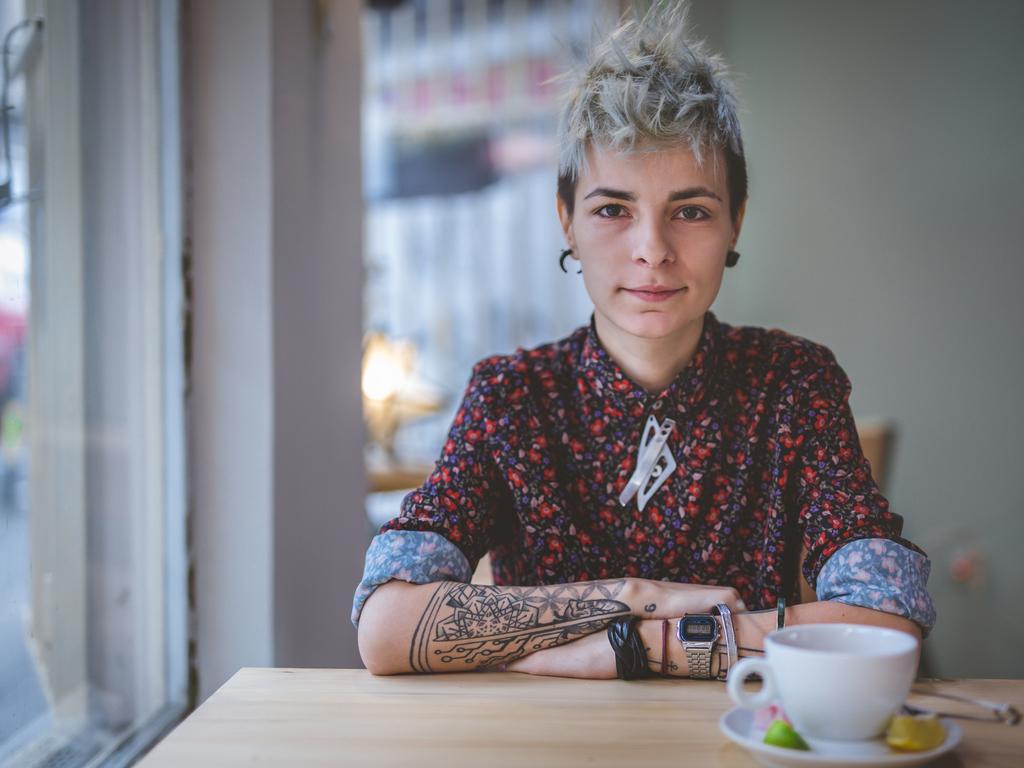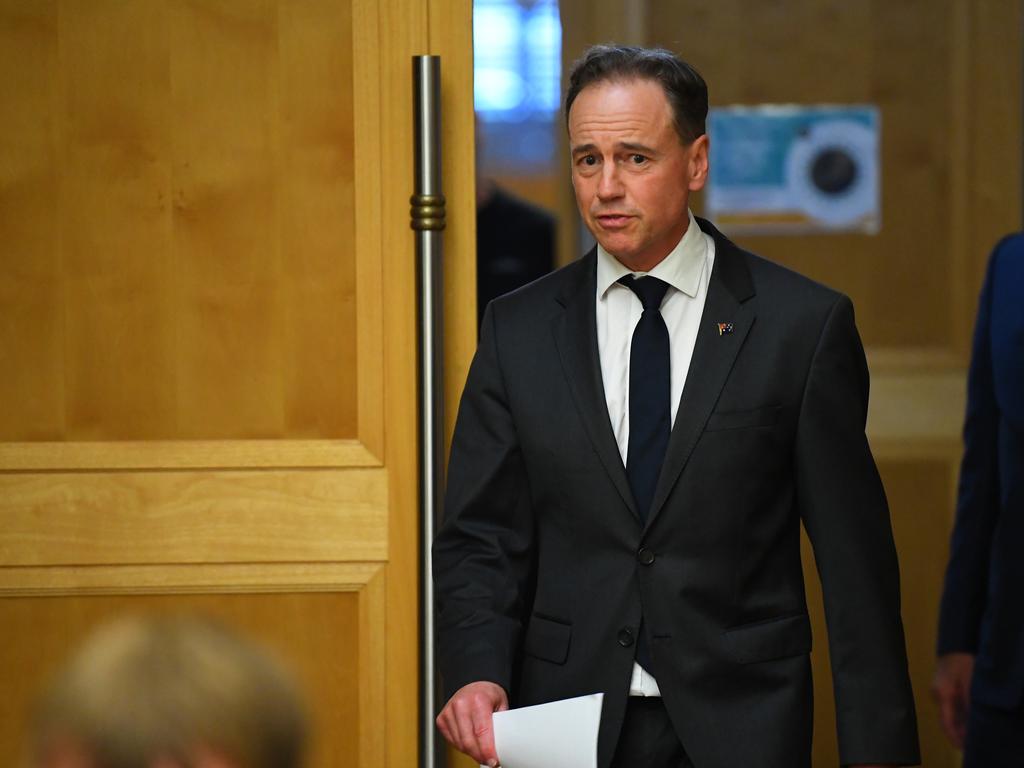Parents want veto of trans lessons in schools
A strong majority of voters polled across both major parties want parents to have a veto over classes teaching children they can change gender.

A strong majority of voters polled across both major parties want parents to have a veto over classes teaching children they can change gender.
In the first national survey on so-called “gender fluidity” at school, 88 per cent of Coalition supporters and 72 per cent of Labor loyalists agreed parents should have the right to know what is being taught and be free to pull children out of class.
Kirralie Smith from the group Binary, which commissioned the survey of 3842 people as part of its fight against the “de-gendering of society”, said the solid support for parents’ rights showed politicians could not keep dodging this “hot potato” issue out of fear of attack as “transphobes”.
“The average mum and dad, your average citizen, is concerned about this gender theory that’s being imposed upon children in schools,” Ms Smith said.
“And they will vote accordingly, they have said through this survey that gender issues will be part of their consideration when it comes to the next election.”
Parents’ groups say they believe confusion in class about the unchanging reality of biological sex is part of the reason for the exponential global surge in often troubled teenagers, chiefly girls, declaring themselves transgender and seeking life-changing medical treatment in children’s hospital gender clinics.
Ever since the contentious Safe Schools program was launched in Victoria in 2010, gender fluidity classes have been promoted as vital to stop bullying and suicide but the critics include LGBT community members who say the underlying queer theory allows no boundaries and is at odds with safeguarding of children.
In Binary’s survey, almost half of those who voted Greens (46 per cent) backed parents’ rights over gender fluidity teaching. The party has had bitter internal disputes here and in Britain over claims that women’s rights and safety are being sacrificed so males can simply declare themselves female.
From class to clinic?
Concern in the survey about teachers telling students they can change gender “based on how they feel” cut across age groups, reaching almost 80 per cent among young people around the age of marriage, and was strongest in Western Australia and Queensland, and least pronounced in Victoria.
These three states have the biggest children’s hospital gender clinics and promote self-identified trans rights in school, although states outside Victoria shun the Safe Schools brand, which was damaged by media scrutiny in the run-up to the Turnbull government stripping it of federal funding.
Binary’s survey report trumpets Scott Morrison’s 2018 remark “We don’t need ‘gender whisperers’ in schools; let kids be kids”.
Results from the anonymous phone poll, run in March, were weighted for age, sex and location.
Ms Smith is a Christian with conservative politics who gained a profile campaigning against same-sex marriage and Islamic Halal certification.
She said her group included many who were not religious and whose concern was not politics but dismay at children being confused about biological facts by appeals to emotion.
“I don’t ever condone attacking individuals, or bullying or harassment but I am absolutely a huge advocate for the right to criticise ideologies,” she said.
The explosion in gender clinic caseloads has coincided with litigation in Britain and Canada to safeguard schoolgirls against gender fluidity rules and doctrine.
‘Girls not asked’
In the UK this month, Oxfordshire’s education authorities became the first in the country to back down over new pro-trans school rules, after a 13-year-old girl took a case to the High Court arguing it was a breach of safeguarding to allow biological males into girls’ toilets, changing rooms and dormitories.
“The (Trans Inclusion) Toolkit has a very significant impact on me as a girl,” the unidentified girl said. “I am very surprised that the council never asked the opinion of girls in Oxfordshire about what we thought before they published the toolkit.”
In Canada last month, an Ontario human rights tribunal granted a full hearing for a case brought by the mother of a six-year-old girl who came home crying after a 2018 gender fluidity class in which the teacher showed a video called Gender Queer Kid Stuff and explained “girls are not real, and boys are not real”.
The girl wanted to know why her female identity was not real and asked if she could “go to the doctor” to do something about it.
Her mother, Pamela Buffone, founder of the group Canadian Gender Report which opposes trans medicalisation of children, told The Weekend Australian: “Many parents have told me that their children became convinced they were trans after a school workshop usually in middle school — average age about 11.
“Kids naturally explore and try on different identities through puberty and there’s definitely growing evidence that many grow out of this phase of gender politics that’s being foisted on them and reinforced by many parts of our culture and social media.”
Some parents’ groups and young adult “detransitioners” who regret gender change see a link between this education trend and trans medicalisation of troubled girls going through puberty.
“I’ve seen the damage (this doctrine) does),” said “Jane”, not her real name, whose daughter declared herself a trans boy after bullying and a descent into mental illness.
Now 19, still depressed and on testosterone, her daughter’s weight has ballooned and Jane is worried about a host of health issues. The family, from a NSW regional city, has been traumatised by the ordeal.
“Gender and sex are being confused (in school) — it starts to introduce this confusion, especially with vulnerable young people like our daughter,” Jane said.
“Some parents I’ve spoken to have said their children who are on the autism spectrum have been sucked into this (trans identity) — these are kids who are looking for somewhere to fit in. Other parents, their kids have had sexual abuse.
“We see that these children need support and therapy, not drugs.”
Ginger group
Recently Jane’s 15-year-old son came home angry and upset over gender identity homework from his public high school, complete with the Genderbread Person character, an international hallmark of gender fluidity; references to people being “bi-gender” and “a-genda”, as well as a task to analyse the Safe Schools program.
The Genderbread Person was reportedly banned in NSW government schools following a 2017 review. This week the office of Education Minister Sarah Mitchell insisted gender fluidity was “not taught in NSW public schools” and the Safe Schools program had never been part of the state curriculum.
In Australia and overseas, trans activism in schools has aroused opposition from an uneasy coalition between the religious right, “gender critical” feminists who say tomboys are at risk of trans medicalisation, lesbians angry at biological males claiming their identity, and professionals objecting to what they see as pseudoscience in the education system.
Hundreds of scientists, including prominent American biologist Heather Heying, have put their names to an international petition called Project Nettie, which argues it is “wholly ideological, scientifically inaccurate and socially irresponsible (to) recast biological sex as a social construct, which then becomes a matter of chosen individual identity”. Nettie Stevens was an American female geneticist who discovered sex chromosomes in 1905.
Victoria’s education minister James Merlino pleaded “confidentiality” when asked how many children had been referred without parental approval to the Royal Children’s Hospital gender clinic by GPs under his department’s Doctors in Secondary Schools program. These visiting doctors have had gender training from the RCH clinic.
“The same rules apply to doctors in schools as they do in the community — medical information is kept confidential and not disclosed to schools or the department,” a spokesman said.
The RCH clinic director Michelle Telfer promotes The Gender Fairy, a booklet by former teacher Jo Hirst with collaboration by Safe Schools co-founder Roz Ward, which tells young children: “Only you know whether you are a boy or a girl. No one can tell you”.
Champions of the “gender affirmative” treatment model argue they merely recognise a child’s true gender identity, following a mistaken “assignment” of gender at birth.
They claim hormone drugs and surgery for young people after puberty’s onset are sometimes necessary for mental health, preventing suicide attempts, but cautious advocates of the treatment approach admit the evidence is poor quality, short-term and patchy.
Health and education ministers in Victoria, Queensland and Western Australia did not answer when asked if they had sought briefings or commissioned research on any link between gender fluidity in class and the poorly understood spike in teenage patients in gender clinics.
Beyond genitals
Gender fluidity in the classroom and an abandoned plan for pro-transgender unisex toilets in a new Brisbane school have been political flashpoints in Queensland, which goes to the polls on October 31.
In September a public health doctor gave a “Genderbread Person” talk to a Brisbane Year 10 class, explaining it was “important to expand the idea of sexuality beyond the narrow focus of sex and genitals”. Queer theory argues a male with a penis can be a lesbian.
Parents complain they struggle to get straight answers about what their children are being taught.
Queensland education department documents obtained under FOI laws, including briefing notes to the current minister Grace Grace, explain to schools that children may be “transgender, a-gender (having no gender), bi-gender (having two distinct gender identities, either at the same or different times), and non-binary (gender identities that are not exclusively masculine or feminine)”.
The 99-page cache of documents covers gender diverse training for teachers, guidelines for toilet use, uniforms and school camps, and reports of parents objecting to gender fluidity materials.
In one note, the department said officials would “strengthen relationships” with the gender clinic at the Queensland Children’s Hospital — where under-18 patient numbers have risen 1,172 per cent since 2014 — and keep working with the Queensland Queering Education Consultative Committee.
This committee is led by teacher training academic Lisa van Leent, whose research argues that “childhood innocence” is a socially constructed “ideology” and “myth” that is an obstacle to scholarship.
“It is difficult to justify moving research on sex education of diverse sexualities into the primary school arena when beliefs about childhood innocence still exist,” she wrote in her Queensland University of Technology thesis.
“Acknowledgement of children as sexualised is necessary to consider heteronormativity in the primary school context.
“Heteronormativity is bound by binary concepts of male and female gendered identities constructed at birth which support heterosexual stereotypes of boy and girl, man and woman.”
The Weekend Australian does not dispute that Dr van Leent believes her research serves the welfare of young people with diverse gender and sexuality.
Inclusive classes
Asked about gender fluidity, a spokesman for Ms Grace said: “Our state schools are committed to providing a safe, supportive and inclusive environment where all students, including LGBTIQ+ students, can reach their full potential”.
Although Safe Schools at the federal level was disavowed and defunded by the Coalition, program materials are still endorsed by the federal education department which includes them on its one-stop-shop Student Wellbeing website aimed at teachers, parents and students.
A spokesman for federal education minister Dan Tehan said the material had been given the all-clear as “educationally sound” after an independent review by former education academic Bill Louden.
Mr Tehan did not answer when asked if the federal government would revisit its endorsement of Safe School materials in the light of the gender clinic controversy.
Shadow minister Tanya Plibersek refused to answer any questions about gender fluidity teaching.
“After weeks of disruption to schooling, my focus is on getting kids up to speed on their reading, writing, and maths,” she said.
The Safe Schools materials on the federal education website present children as experts when their gender identity is at odds with biology, and do not suggest any therapeutic probing for mental illness, autism or suppressed same-sex attraction as possible causes underlying a trans declaration.
Ms Ward has said the program’s approach “may seem complicated, but the transition is much more about the school transitioning than the student, because the student is just affirming who they really are”.
One brochure on the federal website encourages teachers to allow students to change gender without parents’ approval, saying, “The person who understands most about their gender transition or affirmation is the student themselves … It may be possible to consider a student a mature minor and able to make decisions without parental consent”.
This is among Safe Schools material used to train WA public school teachers but rebadged with different graphics as “Inclusive Education WA” and delivered by the WA Aids Council with taxpayers’ funds. In small print, it acknowledges Ms Ward as an author.
A spokeswoman for WA Education Minister Sue Ellery said: “Principals make local decisions regarding the materials used to deliver the school’s teaching program. Parents are encouraged to discuss their child’s school program with their school”.
The Weekend Australian sought comment from RCH and Dr van Leent. Ms Ward could not be reached for comment.







To join the conversation, please log in. Don't have an account? Register
Join the conversation, you are commenting as Logout